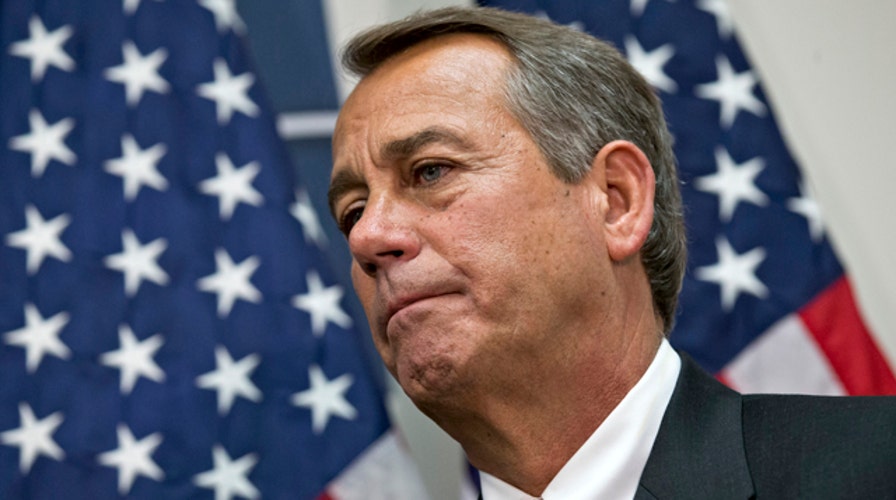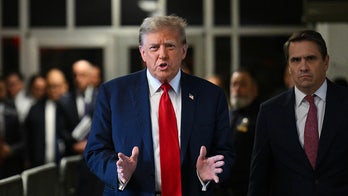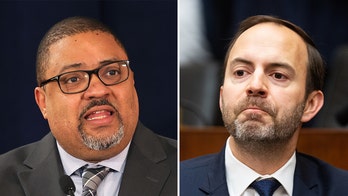Is Boehner caving on tax hikes?
Will the president get his way on higher rates for the wealthy?
President Obama and House Speaker John Boehner met for 45 minutes Monday morning at the White House, in the latest push to iron out the particulars of a possible deal to avert the looming fiscal crisis.
An end-of-the-year deadline fast-approaching, the debt ceiling is emerging as perhaps the biggest sticking point in negotiations.
The speaker, in a possible breakthrough toward a deal, last week offered Obama a compromise by proposing a tax rate hike on those making over $1 million. However, the speaker's office insists that Boehner will stand by his condition that the debt ceiling be raised only if Washington cuts spending by an amount greater than the increase.
The debt ceiling issue was emerging as a sticking point, not just between Boehner and Obama but between Boehner and his Republican caucus.
Boehner's office tried to assure conservatives on Sunday that he was not backing off his debt-ceiling demands, following a report in The Washington Post that he offered to push off any battle over the debt ceiling for another year.
Boehner's office called the story "highly misleading."
"Our position has not changed," Boehner spokesman Michael Steel said. "Any debt limit increase would require cuts and reforms of a greater amount."
Boehner and other Republicans have so far refused Obama's demand that he be given the authority to raise the debt ceiling whenever he wants. At issue, though, appears to be whether to include a one-time increase in the debt ceiling as part of this deal.
Some Republicans would prefer to mount a separate fight to extract massive spending cuts in exchange for an increase in the debt ceiling early next year.
The Post story suggests Boehner offered to raise the debt ceiling this time -- but only if Obama agrees to $1 trillion in spending cuts.
Boehner is asking for $1 trillion in spending cuts over the next 10 years from government benefit programs like Medicare, the federal health care program for the elderly. Those cuts would defer most of a painful set of across-the-board spending cuts set to slash many domestic programs and the defense budget by 8-9 percent, starting in January.
On the revenue side, Boehner's offer calls for about $450 billion in revenue from increasing the top rate on million-dollar-plus income from 35 percent to the Clinton-era rate of 39.6 percent. The additional revenue required to meet Boehner's $1 trillion target would be collected through a rewrite of the tax code next year and by slowing the inflation adjustments made to tax brackets.
Both sides are caught between the demands of the other, and their own parties. Obama, and many congressional Democrats, want to raise taxes on households making more than $250,000. Boehner's offer marks a much higher threshold than they prefer.
White House Press Secretary Jay Carney reiterated Monday that Obama believes the only plan that achieves the "balance" Obama wants is the plan the president has put forward. Still, he said, Obama "believes that a deal is possible."
Obama also faces opposition from many Democrats to any substantive cuts in Medicare.
For his part, Boehner faces another problem. Even if he extracts $1 trillion in spending cuts from the president, some Republicans are likely to see this as a trade-off for tax increases -- not a trade-off for a debt ceiling increase.
The conservative Club for Growth chided Boehner on Monday about the latest developments.
"First Speaker Boehner offered to raise tax rates after promising not to, and now he's offering to raise the debt ceiling. Raising tax rates is anti-growth and raising the debt ceiling is pro-government growth - and this is the Republican position?" Club for Growth President Chris Chocola said.
Obama has offered $600 billion in spending cuts over a decade, including $350 billion from federal health care programs and $250 billion from other cuts to domestic programs like farm subsidies and the pension program for federal workers, and through sales of used federal property.
Obama and Boehner met Thursday in a session described as "frank" by both sides. Boehner's offer and a follow-up phone call came the next day.
The Associated Press contributed to this report.





